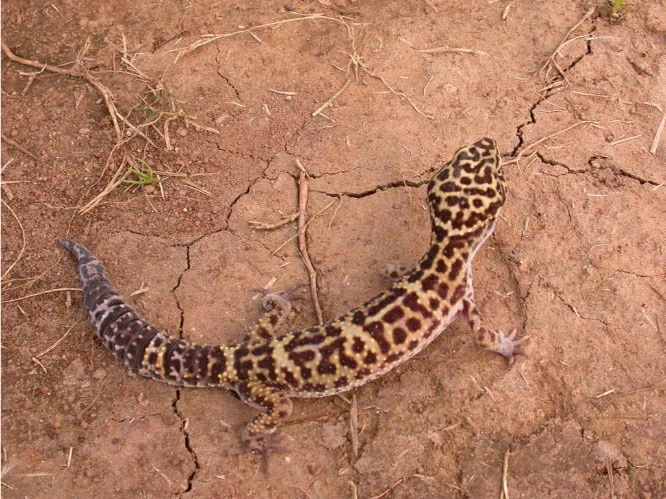If you’ve ever wandered in a desert at night, you might see tiny geckos darting across rocks, moving surprisingly fast. Nearby, a scorpion might be quietly hiding under a stone.
You might wonder: do geckos actually eat scorpions, and if they do, how do they manage something so dangerous?
Yes, some geckos do eat scorpions, but it’s risky and takes skill. These geckos aren’t careless. They rely on speed, agility, and careful hunting to grab scorpions without getting stung. In harsh desert environments, a scorpion is packed with protein and energy, worth the danger if caught safely.
Why Geckos Sometimes Hunt Scorpions
Scorpions move slower than many desert insects, and they’re full of protein and fat. For a hungry gecko, that makes them very tempting.
In deserts where insects can be scarce, scorpions can become a very important food source, especially for larger geckos.
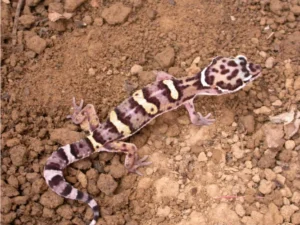
Geckos that hunt scorpions usually wait for the right chance. They don’t go out hunting scorpions every night.
Instead, they watch, wait, and strike when the scorpion is in the right position, usually unaware of the gecko nearby.
How Geckos Avoid Getting Stung
A scorpion’s sting is dangerous, and geckos know it. They use a few tricks to stay safe:
-
Speed: They strike fast, closing the distance before the scorpion can react.
-
Precision: They aim for the body, often the head or underside, which lowers the chance of getting stung.
-
Timing: They hunt when scorpions are less active or distracted, like early at night or in cooler temps.
Even with these strategies, there’s still risk. Some geckos get minor stings, but their small size and fast metabolism help them handle venom better than bigger predators would.
How Do Geckos Hunt Scorpions?
Hunting a scorpion isn’t like chasing a moth. It takes patience, stealth, and exact timing.
A gecko creeps slowly toward its prey, body low, tail flicking for balance.
When the scorpion is close enough, the gecko lunges, bites, and holds it down until it stops moving before swallowing it whole.
It’s a delicate move: one wrong step and the gecko could get hurt.
Do All Geckos Eat Scorpions?
Not all geckos take on scorpions. Only some desert and arid-region species do.
-
Leopard geckos eat small scorpions in parts of Pakistan and India.
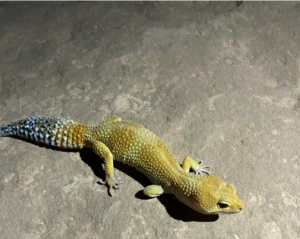
-
Mediterranean house geckos sometimes hunt scorpions that wander into buildings.
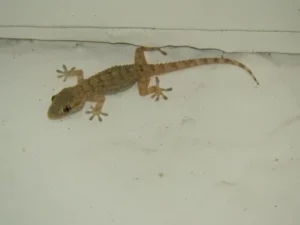
-
Smaller geckos usually stick to safer insects like crickets, beetles, or moths.
Scorpion-eating geckos tend to be bigger, braver, and built to handle venomous prey.
How Baby Geckos Learn to Handle Dangerous Prey
Young geckos start with safe, small insects. As they grow, they might come across scorpions. They instinctively learn where to strike.
Small stings or close calls teach caution. Over time, they develop precise reflexes, learning how to hold scorpions safely.
Even young geckos follow their natural hunting instincts carefully.
How Geckos Digest Scorpions
Once captured, a scorpion is a big meal. Geckos swallow it whole, using their sticky tongues and tiny teeth to guide it down.
The venom usually gets neutralized in the stomach, and the protein and fat fuel the gecko for hours or even days.
In deserts, this energy is very important. A single scorpion can keep a gecko active and alert when insects are scarce.
Risks of Hunting Scorpions
Hunting scorpions is dangerous. A slow reaction or missed strike can mean a sting, causing pain, swelling, or temporary paralysis for smaller geckos.
Some geckos bite and retreat quickly, using speed to escape. Others wait until a scorpion is trapped under a rock, reducing the risk.
How Geckos Fit Into the Desert Ecosystem
Geckos help control scorpion numbers naturally. By hunting, they prevent overpopulation, which could threaten other small creatures.
In turn, geckos get a rich, though risky, food source.
This predator-prey relationship is a balance. Geckos don’t wipe out scorpions, but they keep their numbers in check, helping the desert ecosystem stay healthy.
Do Geckos Eat All Types of Scorpions?
Geckos usually avoid bigger or highly venomous scorpions. They focus on smaller species they can safely handle.
-
Small desert scorpions are just right for geckos.
-
Very aggressive or large scorpions are left alone or only eaten when trapped.
Geckos are selective, showing they know their limits and risks instinctively.
Watching Gecko and Scorpion Interactions
Seeing a gecko hunt a scorpion is like watching a tiny battle. The gecko freezes, the scorpion senses movement, then a sudden strike happens. It’s fast, silent, and precise.
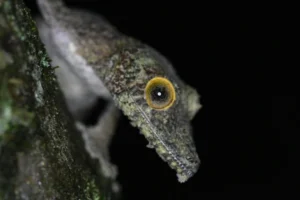
After striking, the gecko often retreats, licks its lips, and waits for the next chance.
Each hunt is calculated, not careless, showing the instinct and smarts geckos use to survive.
Are Scorpions an Important Part of a Gecko’s Diet?
For some desert geckos, scorpions are sometimes essential, especially when insects are scarce.
But most of the diet is still crickets, beetles, moths, and other safer prey.
Scorpions are a high-reward snack and a supplemental protein source, showing the gecko’s adaptability and courage.
Conclusion
Some geckos do eat scorpions, but it’s dangerous and requires careful planning.
These small hunters rely on speed, timing, and precision to capture venomous prey safely. Scorpions give high protein and energy, making them a valuable meal in harsh deserts.
Watching a gecko strike a scorpion shows instinct, smarts, and courage on a tiny scale.
It’s a clear example of how geckos adapt to survive, balancing risk and reward with every meal.
Hi, my name is Ezra Mushala, i have been interested animals all my life. I am the main author and editor here at snakeinformer.com.

